- Home
- W. Somerset Maugham
Merry Go Round Page 13
Merry Go Round Read online
Page 13
'Well, what did Frank tell you?' asked Miss Ley, when she had kissed Bella.
'He says that Herbert has consumption and must spend the winter abroad.'
'I'm very sorry; but is that possible?'
'Only if I take him.'
'My dear, how can you?' cried Miss Ley, astonished.
Bella hesitated and blushed.
'I'm going to ask him to marry me. It's no good now to counterfeit modesty and all the rest of it. It's the only way I can save his life, and after all, I love him better than anyone else in the world. When I told you a month ago that it was impossible I should care for a boy almost young enough to be my son, I lied. I fought against it then as something shameful and ridiculous, but I've loved him from the very first day I saw him.'
Bella's vehement seriousness alone prevented Miss Ley from indulging in her usual irony. She carefully repressed the smile which struggled to gain possession of her lips.
'Your father will never consent, my dear,' she said gravely.
'I hope he will when I explain the circumstances. I'm afraid he'll be dreadfully distressed, but if he refuses I shall remember that I'm a grown woman, capable of judging for myself.'
'I don't know what hell do with you. He's entirely dependent on you for all his comfort and all his happiness.'
'I've served him for forty years. I gave him all my youth, not because it was my duty, but because I loved him. Now someone needs me more than he does. My father is rich; he has a comfortable home, books and friends, and health. Herbert has nothing but me. If I take care of him, I may give him a few more years of life, and if he dies I can soothe his last days.'
Miss Langton spoke rapidly, with such determination that the elder woman saw it was useless to argue; her whole mind was set on this idea, and neither the persuasion of friends nor the entreaties of a father would hinder her.
'And what does the young man say to it?' asked Miss Ley.
'The thought has never entered his head. He looks upon me as a middle-aged woman to whom all things of love are absurd. Sometimes he's laughed at me because I'm so practical and matter-of-fact.'
'Where is he?'
Before Bella could answer there was a ring at the door, and they heard Herbert ask the butler if Miss Langton had come in.
'There he is!' cried Bella. 'Let me go to him now, Mary. He's going up to the drawing-room. Oh, I feel so dreadfully nervous.'
'Don't be ridiculous, Bella,' answered Miss Ley, smiling. 'I've never seen a woman about to propose marriage to the object of her affections who was quite so self-possessed as you.'
But at the door Miss Langton stopped, and with a very piteous expression looked at her friend.
'Oh, I wish I weren't so old, Mary. Tell me honestly, am I awfully plain?'
'You're a great deal too good for a silly young hobbledehoy, my dear,' said Miss Ley, hiding by roughness of manner something very like a sob. 'If he had any sense, he'd have insisted on marrying you three months ago.'
When Bella closed the door, Miss Ley's eye caught the bronze statue of Narcissus, standing on a pedestal in that eternal attitude of adorable affectation, one long forefinger outstretched, and his listening head bent slightly to one side. She addressed him irritably.
'I wish you wouldn't look so shocked and puzzled and self-conscious of your beauty. You ought to know that when love and self-sacrifice are combined in the heart of a middle-aged woman, nothing on earth will prevent her from acting like a perfect lunatic. In your day the old maid was unknown, and you can't possibly understand her emotions, for, extraordinary as it may appear, even old maids are human. And if you are scandalized at this disproportion of ages, know that you are an idiot, ignorant of the elements both of psychology and of physiology. And I myself have adored generations of young men, though the relations between us have invariably remained strictly platonic'
Narcissus, listening intently to the dying cries of Echo, remained indifferent to Miss Ley's harangue, and she turned away impatiently.
Entering the drawing-room, Bella found Herbert standing at the window, and he came towards her with a smile. She saw that already he was more collected, and though his face was pale and grave, it bore no longer that disfigurement of fear.
'You didn't think it unkind of me to leave you to come home by yourself, did you?' he asked gently. 'I was a little bothered just then, and I felt if I weren't alone I should make a fool of myself.'
She took his hand and held it.
'You know that I can never think anything you do unkind. But tell me now if you have decided anything.' She hesitated, but it seemed futile to utter expressions of regret; for at that moment how could they comfort him? 'I should like you to know that you can depend on me always.'
'It's very good of you. I don't know that there's anything much to decide. I dare say I shall soon get used to the idea of not looking into the future, but it'll be rather hard at first, because it was all I had at that dreary bank. I shall stay there as long as I can, and when I grow too ill I must try and get into the hospital. I dare say the Dean will help me to be admitted.'
'Oh, don't talk like that! It's too horrible,' cried Bella wretchedly. 'Isn't there anything I can do? I feel so utterly helpless.'
He looked at her for a while.
'Well, yes, there is,' he answered presently. 'There's one thing I wished to ask you, Bella. You've been an awfully good friend to me, and now I want you more than ever.'
'I'll do anything you wish,' she said, with a beating heart.
'I'm afraid it's very selfish. But I don't want you to go away this winter – in case anything happened. You know my sister died three months after the first symptoms were noticed.'
'I'd do so much more for you than that.'
She placed her hands on his shoulders, and gazed into his blue, sad eyes; searchingly she scrutinized his face, paler than ever and more exquisitely transparent, and his soft mouth, tremulous still with the horror of death. She remembered his mouth and his eyes when they were merry with boyish laughter and his cheeks flushed with excitement at his own gay rhetoric. Then she looked down.
'I wonder if you could bring yourself to marry me.'
Although her eyes were turned away, she knew that he blushed deeply, and hopelessly, full of shame, she dropped her hands. It seemed an intolerable time before he answered.
'I'm not so selfish as all that,' he whispered, his voice trembling.
'Yes, I was afraid the thought would disgust you,' she said, with a sob.
'Bella, how can you say that! Don't you know that I should have been proud? Don't you know that you're the only woman I've ever liked? But I won't let you sacrifice yourself for me. I've seen people die of consumption, and I know the ghastliness of it. D'you think I would let you nurse me and do all the odious things that are needful? And you might get ill, too. Oh no, Bella, don't think me ungrateful, but I couldn't marry you.'
'D'you think it would be a sacrifice to me?' she asked in tragic tones. 'My poor boy, you never saw that I loved you with all my soul, and when you were so happy and careless my heart felt as though it would break because I was old and plain. You've forgotten that one day you kissed my hands: it was only a joke to you, but when you'd gone I cried bitterly. You'd never have done it except that you thought I was forty and it couldn't matter. And when you took my arm sometimes I felt sick with love. And now, I suppose, you utterly despise me.'
She broke down, sobbing; but in a little while impatiently she brushed away her tears and faced him with a sort of despairing pride.
'After all, what am I but a middle-aged woman? I've never been even pretty, and my mind is narrow because I've lived all my life among paltry things, and I'm stupid and dull. Why should I think you would care to marry me because I love you like a fool?'
'Oh, Bella, Bella, don't say that. You break my heart.'
'And you thought it was self-sacrifice on my part! I was only asking you because I wanted to be with you every moment – if you fell ill, I couldn't bear
that anyone else should touch you. I've been lonely in my life, so dreadfully lonely, and I was making one last bid for happiness.'
She sank into a chair and hid her face, but Herbert, kneeling beside her, took her hands.
'Look at me, Bella. ... I thought you only suggested it because you know I ought to leave the bank, and have someone to look after me. I never suspected that you really cared for me. And I'm ashamed because I was blind. But don't you know that there's nothing I should like better than to be with you always? Then I should care nothing for my illness, because it would have brought me a greater happiness than I ever dared to hope for. Bella, if you don't mind that I'm poor and ill and unworthy of you, will you marry me?'
On a sudden she stopped in the middle of her silent crying and a radiant smile chased away the sorrow. For one moment, while she realized the meaning of his words, she looked at him half in doubt; then, bending down, she kissed his hands.
'Oh, my dearest, you've made me so happy.'
When at last they went to Miss Ley, Bella's tear-filled eyes shone with unspeakable bliss; and the elder woman, looking at Herbert, no longer wondered at her cousin's infatuation for him, for his face, so candid and sweet, was like the face of a young beautiful saint in an old picture.
12
IT was Frank's habit after his work at the hospital to have tea with Miss Ley, but when, that afternoon, he arrived at Old Queen Street she was surprised at the pallor of his face, from which shone with unnatural brilliancy the dark eyes. They seemed larger than ever she had seen them, and his harassed look told her that he was suffering: the square jaw was set firmly, as though with strong deliberation he held himself in hand.
'You're so late,' she said. 'I thought you wouldn't come.'
'I'm very tired,' he answered, in a strained voice.
She poured out tea, and while he ate and drank, to give him opportunity to collect himself, read the evening paper. With admirable insight, she alone, of his friends, had divined Frank's emotional temper; and though never hinting at the knowledge, for she was aware it humiliated him to have so little self-control, could in consequence handle him with very subtle skill. Presently fetching his tobacco, for they sat in the library, he lit his pipe; he blew the smoke from his mouth in heavy clouds.
'Is it very comforting?' asked Miss Ley, smiling.
'Very!'
Waiting till he was ready to speak, she returned to her news-sheet, and though she felt his eyes rest curiously upon her, took no notice.
'I wish to goodness you'd put that paper down,' he cried at last irritably.
With a faint smile she did as he suggested.
'Have you had a very hard day, Frank?'
'Oh, it was awful!' he answered. 'I don't know why, but it all seemed to have a greater meaning for me than ever before. I couldn't get out of my head the utter misery of that poor boy when I told him his chest was affected.'
'I wish the whole thing weren't so ordinary,' murmured Miss Ley. 'The consumptive poet and the devoted old maid! It's so fearfully hackneyed. But the gods have no originality; they always make their aesthetic effects by confounding the tragic and the commonplace. ... I suppose you're quite certain he has phthisis?'
'I found bacilli in the sputum. Where are they both now?'
'Bella took him back to Tercanbury, and I've promised to follow on Monday. She's going to marry the boy!'
'What!' cried Frank.
'She wants to take him abroad. Don't you think if he winters in the South Nature will have some chance with him?'
'In nine cases out of ten Nature doesn't want to cure a man; she wants to put him in his coffin.'
Rising from his chair, Frank walked restlessly up and down the room. On a sudden he stopped short in front of Miss Ley.
'D'you remember your friend Mr Farley telling us the other day that pain ennobles a man? I should like to conduct him through the wards of a hospital.'
'I have no doubt that when he has a tooth drawn Mr Farley takes care that gas should be properly administered.'
'I suppose divines can only justify pain by ascribing to it elevation of character,' cried Frank savagely. 'If they weren't so ignorant they'd know it requires no justification. You might as well assert that a danger-signal elevates a train; for, after all, pain is nothing more than an indication by the nerves that the organism is in circumstances hurtful to it.'
'Don't lecture me, Frank, there's a dear!' murmured Miss Ley mildly.
'But if that man had seen as much pain as I have he'd know that it doesn't refine; it brutalizes. It makes people self-absorbed and selfish – you can't imagine the frightful egoism of physical suffering – querulous, impatient, unjust, greedy. I could name a score of petty vices that it engenders, but not a single virtue. ... Oh, Miss Ley, when I look at all the misery of the world I am so thankful I don't believe in God.'
As though seeking to break through the iron bars of the flesh, like a wild beast unquietly he paced the room.
'For years I've toiled night and day to distinguish truth from falsehood; I want to be clear about my actions, I want to walk with sure feet; but I find myself in a labyrinth of quicksands. I can see no meaning in the world, and sometimes I despair; it seems as senseless as a madman's dream. After all, what does it tend to, the effort and the struggle, hope, love, success, failure, birth, death? Man emerged from savagery merely because he was fiercer than the tiger and more cunning than the ape; and nothing seems to me less probable than that humanity advances to any ideal condition. We believe in progress, but progress is nothing but change!'
'I confess,' interrupted Miss Ley, 'that I sometimes ask myself how it benefits the Japanese that they have assumed the tall-hat and the trousers of Western civilization. I wonder if the Malays in their forests or the Kanakas on their islands have cause vastly to envy the London slummer.'
'What does it all end in?' pursued Frank, too much absorbed in his own thoughts to listen. 'Where is the use of it? For all my labour I haven't the shadow of an answer. And even yet I don't know what is good and what is evil, what is high and what is low; I don't even know if the words have any sense in them. Sometimes men seem to me cripples ever seeking to hide their deformity, huddled in a stuffy room, lit by one smoky taper; and they crowd together to keep warm, and they tremble at every unexpected sound. And d'you think in the course of evolution it was the best and noblest who survived to propagate their species? It was merely the shrewd, the hard, and the strong.'
'It would bore me dreadfully to be so strenuous, dear Frank,' answered Miss Ley, with a slight shrug of the shoulders. 'It was a wise man who said that, with regard to the universe, few questions could be asked and none could be answered. In the end we all resign ourselves to the fact, and we find it possible to eat our dinner with no less satisfaction because at the back of our minds stands continually a discreet mark of interrogation. For my part, I think there is as little justification for ascribing an end to the existence of man as there was for the supposition of the Middle Ages (pardon me if I seem erudite), that the heavenly bodies moved in circles because that was the most perfect figure; but I assure you that my night's rest is not in the least impaired. I, too, went through a stormy period in my youth, and if you'll promise not to think me tedious I'll tell you about it.'
'Please do,' said Frank.
He sat down, fixing upon her his piercing eyes, and Miss Ley, as though she had given the matter frequent thought, spoke fluently, with ordered ideas and balanced phrase.
'You know, I was reared on the strictest Evangelical principles to believe certain dogmas on pain of eternal damnation, but at twenty, why I scarcely can tell, all I had learnt fell away from me. Faith presumably is a matter of temperament; good-will has nothing to do with it, and when I look back on my ignorance I am astounded that such ill-considered reasons sufficed to destroy the prejudices of so many years. I was certain then that no God existed; but now I make a point of being certain of nothing: it saves trouble. Besides, each time you make up your mind y
ou rob yourself of a subject for cogitation. But theoretically I cannot help thinking that for a quite reasonable view of life it is necessary to be convinced that no immortality of the soul exists.'
'How can a man lead his life uniformly on the earth if he is disturbed by the thought of another life to come?' broke in Frank eagerly. 'God is a force throwing man's centre of gravity out of his own body.'
'We agreed, Frank, that I was to expound my views,' answered Miss Ley, with some asperity, for interruption she never suffered easily.
'Forgive me,' said Frank, smiling.
'But I agree that your remark, though ill-timed, was not without point,' she proceeded deliberately. 'When man is assured that the insignificant planet on which he lives, and the time, are everything so far as he is individually concerned, he can look about him and order himself according to the surroundings. He is a chess-player with his definite number of pieces, capable of definite moves; and none asks why the castle must run straight, but the bishop obliquely. These things are to be accepted, and with these rules, careless of what may befall when the game is finished, the wise man plays – not to win, for that is impossible, but to make a good fight of it. And if he is wise indeed he will never forget that, after all, it is but a game, and therefore not to be taken too seriously.'
Miss Ley paused, thinking it high time to give Frank opportunity for some remark, but since he remained silent she went on slowly.
'I think the most valuable thing I have learnt in my life is that there is so much to say on both sides of every question that there is little to choose between them. It has made me tolerant, so that I can listen with equal interest to you and to my cousin Algernon. After all, how can I tell whether Truth has one shape only, or many? In how many errors does she linger with a smiling face and insufficient raiment; in what contrary and irreconcilable places does she dwell, more wilful than April winds, more whimsical than the Will-o-the-wisp! My art and science is to live. It is an argument of weak men to say that all things are vanity because the pleasure of them is ephemeral: it may console the beggar to look upon the tomb of kings, but then he must be a fool as well. The pleasures of life are illusion, but when pessimists complain that human delights are negligible because they are unreal, they talk absurdly; for reality none knows, and few care about: our only interest is with illusion. How foolish is it to say that the mirage in the desert is not beautiful merely because it is an atmospheric effect!'

 The Skeptical Romancer: Selected Travel Writing
The Skeptical Romancer: Selected Travel Writing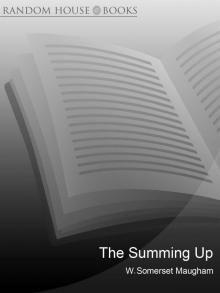 The Summing Up
The Summing Up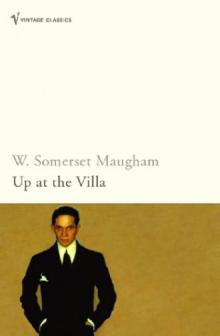 Up at the Villa
Up at the Villa The Razor's Edge
The Razor's Edge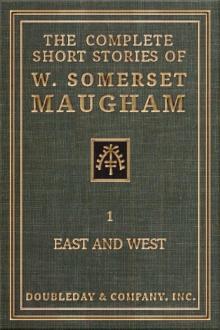 The Complete Short Stories of W. Somerset Maugham: East and West (Vol. 1 of 2))
The Complete Short Stories of W. Somerset Maugham: East and West (Vol. 1 of 2))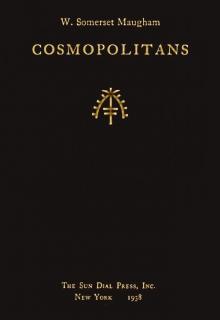 Cosmopolitans
Cosmopolitans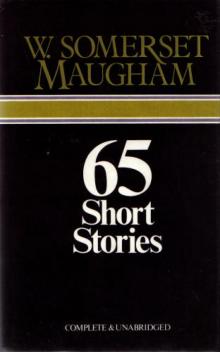 65 Short Stories
65 Short Stories Ah King (Works of W. Somerset Maugham)
Ah King (Works of W. Somerset Maugham)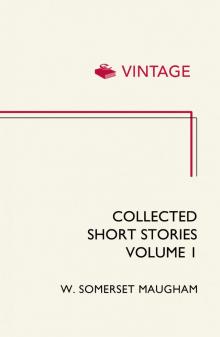 Collected Short Stories: Volume 1
Collected Short Stories: Volume 1 Collected Short Stories Volume 2
Collected Short Stories Volume 2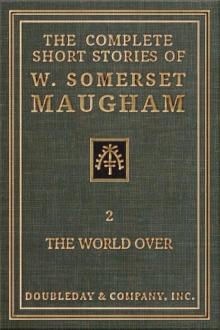 The Complete Short Stories of W. Somerset Maugham - II - The World Over
The Complete Short Stories of W. Somerset Maugham - II - The World Over Collected Short Stories Volume 4
Collected Short Stories Volume 4 Theatre
Theatre Short Stories
Short Stories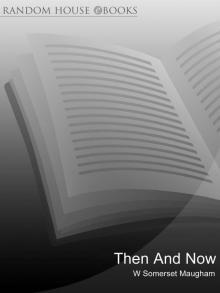 Then and Now
Then and Now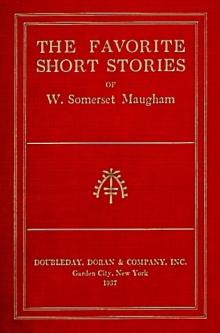 The Favorite Short Stories of W. Somerset Maugham
The Favorite Short Stories of W. Somerset Maugham Of Human Bondage
Of Human Bondage The Magician
The Magician The Great Exotic Novels and Short Stories of Somerset Maugham
The Great Exotic Novels and Short Stories of Somerset Maugham A Writer's Notebook
A Writer's Notebook Christmas Holiday
Christmas Holiday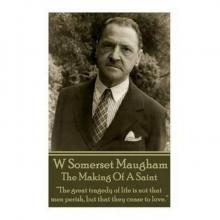 The Making of a Saint
The Making of a Saint Merry Go Round
Merry Go Round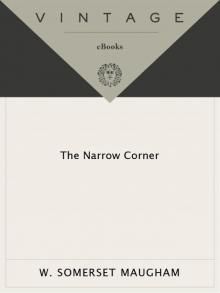 The Narrow Corner
The Narrow Corner Collected Short Stories Volume 3
Collected Short Stories Volume 3 Ten Novels and Their Authors
Ten Novels and Their Authors Ashenden
Ashenden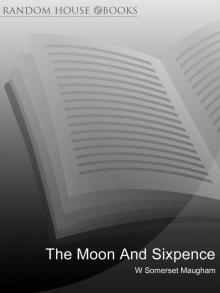 The Moon and Sixpence
The Moon and Sixpence Cakes and Ale
Cakes and Ale Liza of Lambeth
Liza of Lambeth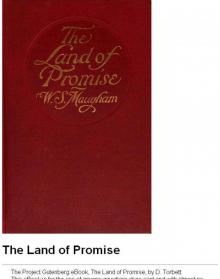 The Land of Promise: A Comedy in Four Acts (1922)
The Land of Promise: A Comedy in Four Acts (1922) A Writer's Notebook (Vintage International)
A Writer's Notebook (Vintage International)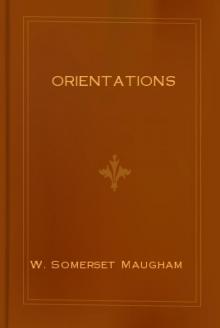 Orientations
Orientations Selected Masterpieces
Selected Masterpieces Mrs Craddock
Mrs Craddock The Skeptical Romancer
The Skeptical Romancer On a Chinese Screen
On a Chinese Screen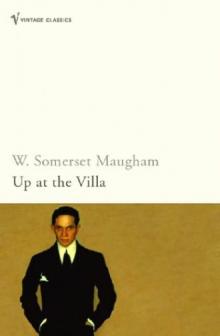 (1941) Up at the Villa
(1941) Up at the Villa The Great Novels and Short Stories of Somerset Maugham
The Great Novels and Short Stories of Somerset Maugham Ah King
Ah King The Explorer
The Explorer The Skeptical Romancer: Selected Travel Writing (Vintage Departures)
The Skeptical Romancer: Selected Travel Writing (Vintage Departures)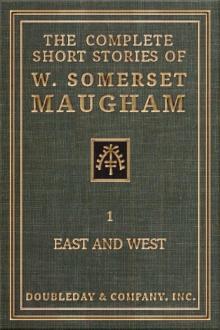 The Complete Short Stories of W. Somerset Maugham - I - East and West
The Complete Short Stories of W. Somerset Maugham - I - East and West